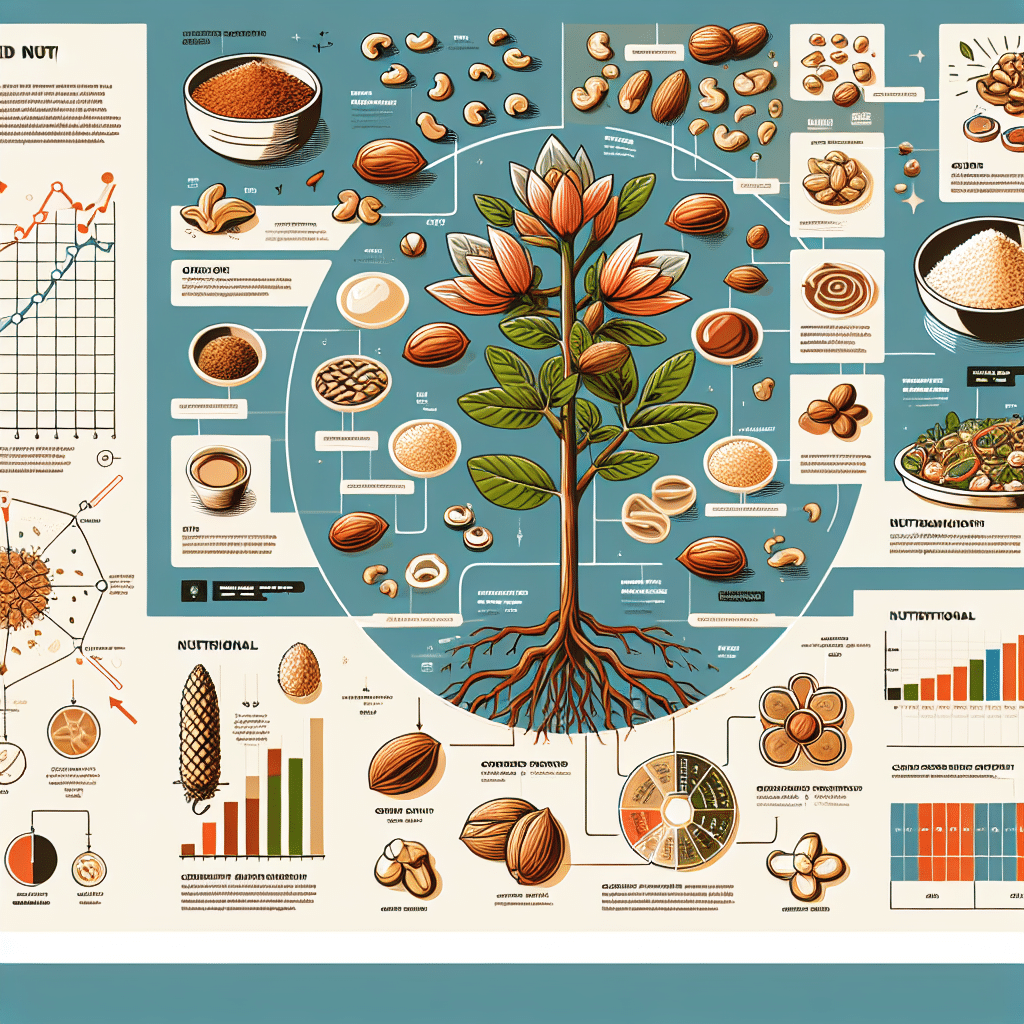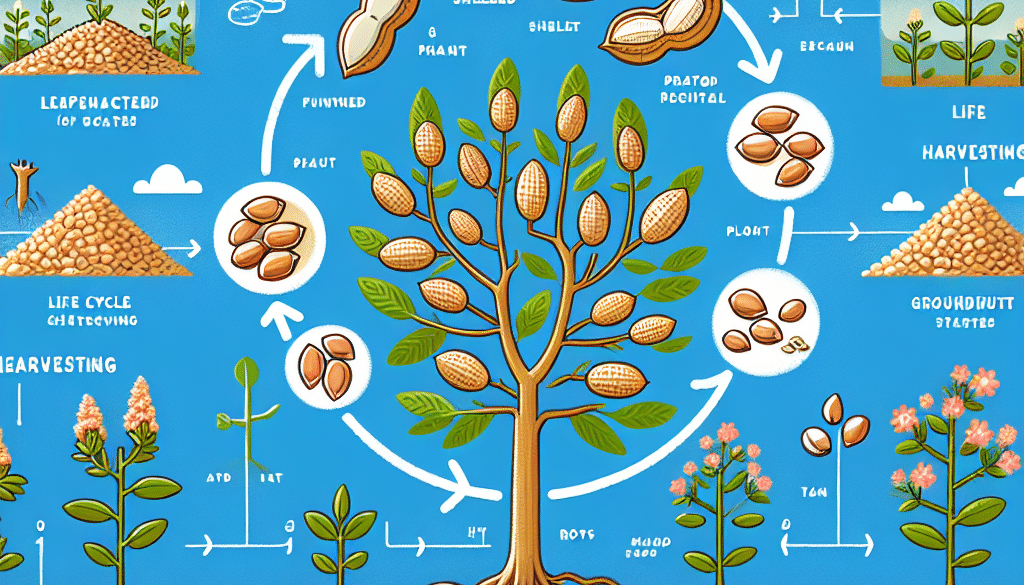What is Ground Nuts: Unearthing the Basics
-
Table of Contents
- Ground Nuts 101: Understanding the Fundamentals
- The Origins and Botanical Background of Ground Nuts
- Types of Ground Nuts
- Cultivation and Harvesting
- Nutritional Benefits of Ground Nuts
- Ground Nuts in Culinary Uses
- Ground Nuts and Allergies
- Environmental Impact and Sustainability
- Conclusion: The Versatile and Nutritious Ground Nut
- Discover ETprotein’s High-Quality Protein Products
Ground Nuts 101: Understanding the Fundamentals

Ground nuts, commonly known as peanuts, are a staple in diets around the world, cherished for their rich flavor and impressive nutritional profile. Despite their name, ground nuts are not true nuts but legumes, related to beans and lentils. This article delves into the basics of ground nuts, exploring their origins, types, cultivation, nutritional benefits, and uses in various cuisines.
The Origins and Botanical Background of Ground Nuts
Ground nuts (Arachis hypogaea) originated in South America and have been cultivated for thousands of years. They play a significant role in the agricultural history of many cultures. The plant itself is quite fascinating; after pollination, the flower stalk elongates and bends towards the ground, burying the fertilized ovary underground where the peanut actually develops. This unique process is known as geocarpy.
Types of Ground Nuts
There are several varieties of ground nuts, each with distinct characteristics:
- Runner peanuts: Known for their uniform size and widespread use in peanut butter production.
- Virginia peanuts: Larger in size and often roasted in-shell or used for gourmet snacks.
- Spanish peanuts: Smaller with a higher oil content, commonly used for candy and peanut oil.
- Valencia peanuts: Typically have three or more kernels per shell and are favored for all-natural peanut butter.
Cultivation and Harvesting
Ground nuts thrive in warm climates with well-drained soil. They require a growing season of about four to five months, depending on the variety and climate. Farmers plant them after the last frost and harvest them when the leaves begin to yellow. Harvesting involves uprooting the entire plant and allowing the peanuts to dry before they are separated from the plant.
Nutritional Benefits of Ground Nuts
Ground nuts are a powerhouse of nutrition, offering a variety of health benefits:
- Protein: An excellent source of plant-based protein, essential for muscle repair and growth.
- Healthy fats: Rich in monounsaturated and polyunsaturated fats, which contribute to heart health.
- Fiber: High in dietary fiber, aiding in digestion and promoting satiety.
- Vitamins and minerals: Contain vitamins E and B complex, magnesium, phosphorus, potassium, and zinc.
- Antioxidants: Packed with antioxidants like resveratrol, which may reduce the risk of chronic diseases.
Ground Nuts in Culinary Uses
Ground nuts are incredibly versatile in the kitchen. They can be eaten raw, roasted, or boiled and are a key ingredient in many dishes worldwide. In West African cuisine, they are used to make rich stews and sauces. In Southeast Asia, ground nuts are ground into a paste for satay sauce or tossed into stir-fries. In Western countries, they’re most famously turned into peanut butter or enjoyed as a snack.
Ground Nuts and Allergies
It’s important to note that ground nuts are one of the most common food allergens. Peanut allergies can be severe and life-threatening. Food manufacturers must clearly label products containing peanuts to protect those with allergies.
Environmental Impact and Sustainability
Ground nut farming can be both beneficial and challenging for the environment. On the positive side, ground nuts fix nitrogen in the soil, reducing the need for chemical fertilizers. However, like all crops, they require resources and can be susceptible to pests and diseases, which may lead to the use of pesticides.
Conclusion: The Versatile and Nutritious Ground Nut
In conclusion, ground nuts are more than just a snack; they are a nutrient-dense food with a rich history and a wide range of uses. Their cultivation supports sustainable agriculture practices, and their versatility in the kitchen makes them a global culinary favorite. Whether enjoyed as a quick snack, a spread on your morning toast, or as a part of a hearty meal, ground nuts offer both flavor and nutrition.
Discover ETprotein’s High-Quality Protein Products
If you’re looking for plant-based protein options, consider ETprotein’s range of products. Their organic and non-GMO protein powders, including peanut protein, are perfect for enhancing your diet or creating nutritious food products. ETprotein caters to various industries, ensuring that you can find the right protein solution for your needs.
About ETprotein:
ETprotein, a reputable protein Chinese factory manufacturer and supplier, is renowned for producing, stocking, exporting, and delivering the highest quality organic bulk vegan protein and plant proteins. They include Organic rice protein, clear rice protein, pea protein, clear pea protein, pumpkin seed protein, sunflower seed protein, mung bean protein, peanut protein etc. Their offerings, characterized by a neutral taste, non-GMO, allergen-free attributes, cater to a diverse range of industries. They serve nutraceutical, pharmaceutical, cosmeceutical, veterinary, as well as food and beverage finished product distributors, traders, and manufacturers across Europe, USA, Canada, Australia, Thailand, Japan, Korea, Brazil, and Chile, among others.
ETprotein specialization includes exporting and delivering tailor-made protein powder and finished nutritional supplements. Their extensive product range covers sectors like Food and Beverage, Sports Nutrition, Weight Management, Dietary Supplements, Health and Wellness Products, and Infant Formula, ensuring comprehensive solutions to meet all your protein needs.
As a trusted company by leading global food and beverage brands and Fortune 500 companies, ETprotein reinforces China’s reputation in the global arena. For more information or to sample their products, please contact them and email sales(at)ETprotein.com today.












